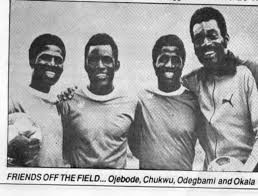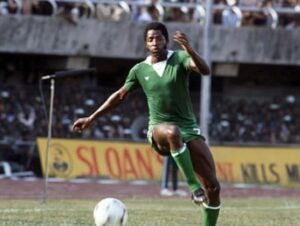Mathematical 7 Goes on Stage:
Segun Odegbami, Abeokuta, and the Making of “Ayinla” by Tunde Kelani
PART 1: SEGUN ODEGBAMI, A BIOGRAPHY
By
Toyin Falola

This interview will be multi-layered. Its focus is on how Tunde Kelani of Mainframe Production transformed the life and music of Ayinla Omowura, an Apala superstar, into a movie to be released in April 2021, and in the process showcase Abeokuta, arguably one of the most colorful Yoruba cities set on the hills. Abeokuta is a city made famous by prominent creative uncommon spirits from the underworld of the Olumo Rock—Fela Anikulapo-Kuti, Wole Soyinka, and Ebenezer Obey, among others—and its politicians, among whom are two presidents of Nigeria—Olusegun Obasanjo and Ernest Shonekan. Even my city of Ibadan lacks this prestige. What Ibadan lacks in creativity, it makes up for in abusive words, such that a cat can boast before a lion and stupid onlookers will cheer it on until it becomes a delicious meal for the king of the forest!
We cannot get to the movie on “Ayinla” without going through Segun Odegbami, aka Mathematical 7, who became an actor, a diarist, and an enthusiast. My interest is in how he captures, in words, the making of a terrific movie.
Nigeria’s history is overshadowed by a phalanx of deprecatory narratives and experiences that almost showcase the country as one with a backward civilization lacking inadequate human capital despite its inherent natural resources. From being the epicenter of poverty in the world’s eyes to being designated as the headquarter for terrorism where security challenges continue to ravage the people and claim their scarce economic resources, one would naturally inscribe in their mind the picture of a country filled with tragedy and chaos, impractical for individual and collective development. Upon a closer view of the country, one cannot but marvel at the magnitude of untapped resources, both human and natural ones available in Nigeria, struggling unnoticed for their collective attention.
It is difficult to find any field in human history—the good, the bad, and the ugly—when Nigeria does not have sufficient contribution from its human capital. Within the African continent, the country is respected not only for immense additions made to advance the continent’s collective course but also because it has produced purpose-driven and hyper-ambitious individuals with indelible imprints in whatever field they find themselves.
Among these individuals is my good friend, Segun Odegbami, a Nigerian with extraordinary soccer competence. Odegbami was one of those who decisively put the country’s name on a global map of relevance in the soccer territory. I played soccer as well, outside right, and represented my schools, but I converted that energy and talent to guerilla warfare in the late 1960s. When I returned to soccer, it was as a coach at Ilaro for a primary school, but we never won a single game. I could run, but not anymore. The last time I tried a few years ago, I stopped at the half marathon. So, my friend’s juju man was better than mine!
Odegbami was born in 1952, some months before me, and both of us were in a rush to experience Nigeria’s independence, although he was probably hastened by his destiny to contribute to the country’s greatness at a time when hopes were high on ex-colonies. There was an urgent need to produce human resources in every area of the country, which was central to its rapid development in the post-independence era. There had been an ill-motivated assumption that the ex-colonies would experience difficulties after they received their independence. Still, Nigeria’s possession of individuals with strong qualities in their chosen fields brought about the deconstruction of this ill-conceived generalization. Odegbami grew from being taught the history of Nigerians who had contributed significantly to advancing the country’s general course; he climbed on their shoulders to make a significant imprint during his formative years. With the likes of Chief Obafemi Awolowo, the one and only political guru, making electrifying contributions at the political front, Chinua Achebe and Wole Soyinka making the country proud in the literary industry, it was apparent that any Nigerian who would have global recognition must be a valuable pioneer in another field or else they would be overshadowed by these titans.
This avatar is considered a trial in soccer, and the fact that he made giant strides in the history of the country’s federation football (often simplyshortened as “football” in Nigeria) confirms the assumption that he wanted success carved out from a different field, this time, in the football field. He is in Nigeria’s soccer Hall of Fame.
 Odegbami and his colleagues
Odegbami and his colleagues
Like its economic boom, Nigerian football (soccer) success stories reached its zenith in the 1970s and spilled over to the following decade. The triumphant run in the period was a testament that the then generation had its eyes on success and would not be distracted even by political and social degenerations happening at a country’s geometric rate. Odegbami stood tall among his people. He became a vibrant addition to the Nigerian team that rewrote the history of the country’s football in the comity of nations. By the time Nigeria lifted the African Cup of Nations in 1980, the influence of Odegbami, alias Mathematical, had become electric in soccer’s redefinition. His name became domestic on the lips of Nigerians and all football lovers across the continent. His team, the “Shooting Stars,” was also my team, and I went to see his live plays not just once, but also during his practice sessions.
Odegbami’s precision singled him out. If he had been a physicist, he could have measured the distance between two planets, considering how he communicated with the two vertical goalposts using the ball as the agency of interaction. There is no contention that if those polls could express themselves in words, they would have unveiled how they are equally miffed by this gifted individual’s creative ability by the ways he manipulated the soccer ball when in the mood. Odegbami scored at will as if he was the custodian of goals and the precursor of precision. He became an intimidating figure against many goalkeepers who usually were confronted with the decision to reduce the damage he would do to them, not to prevent it.
Interestingly, the success of Odegbami in national footballing history continues to reverberate in the country’s records; however, it was preceded by yet another experience of epochal moments while representing his local club, the “Ibadan Shooting Stars.” There was no better way to understand the determination and fervor of Segun Odegbami than to contextualize his hard-fought inclusion in the Shooting Stars of Ibadan, a football club representing the Western State, later broken into several states, including Oyo. If Oyo State of the 1970s lacked anything, it was not in rich human resources, both qualitatively and quantitatively. Taken aside from the State, Ibadan had an enthusiastic record of success occupying the forefront with the many accomplishments made in the country, from being the location of the first television station in tropical Africa to the first University in Nigeria. There are many areas that the state has the record of being exceptional in their engagement, and it was all these that became the very reason for attracting ambitious Nigerians into the metropole. Odegbami would have a mountain of competition awaiting him because different personalities were waiting to make an impact in areas that were considered relatively new. To achieve this dream requires a more serious plan followed by arduous tasks and a commitment to unrivaled quality. He knew this and would not bow down to pressure in his bid to making marks.
Footballing is generally a perfect simulation of life experiences, especially when considering the compelling relationship between them; in life, while everyone’s ultimate goal is to achieve success, perhaps in the bid to change one’s fortune and social status, so also do we have it in the world of football. One competes with an opponent in life in the process of achieving one’s predetermined ambition. Since these opponents, in most cases, are not physically represented, this means that the one’s confronting challenges before the attainment of one’s dreams is a combination of many forces, against which one must battle for the assurance of success. In the Nigerian environment, especially in the Yoruba socio-cultural setting from where Odegbami emerged, it adds color to existential challenges. Forces like poverty, social problems, which in most cases are deliberate creations from the bureaucrats, cultural and institutional issues are usually the most severe impediments one can face in such an environment. The experience is, interestingly, also present in football. The difference is that one’s opponents are known in footballing situations, which means that it is easier to manipulate one’s ways to success. However, there are also existential impediments. Rules guide one’s engagement in football, and the violation of these rules can ultimately lead to disqualification or serious punitive pronouncements. Therefore, one’s success in football deserves recognition because it means that the individual or team has paid obedient attention to the rules despite focusing on victory.
Odegbami scaled these hurdles, especially at the local level with Ibadan Shooting Stars, and became the attraction of football managers who believed he could show his talent at the national level. It was more confounding because he ticked all the boxes of success in Ibadan, a place where there was heated competition for success. In whatever field one finds oneself in the metropole, it was more important to attain one’s dreams than to complain about forces inhibiting one from attaining the goal. Odegbami’s parents inculcated in him the knowledge that success is essential as it is the foundation upon which one’s social status change is built. He familiarized himself with this wisdom through his relationship with the environment and continued to be guided by it. For him, getting to the peak of success was non-negotiable. It was better to find different morally acceptable means to attain it than to fail while attempting it through one way. He was determined, and even though he was attractively talented in football, Odegbami was pursuing his dream of success through another means. While he was making moderate progress in his footballing career, he was simultaneously studying Engineering at The Polytechnic Ibadan. The Yoruba people from where he came believed that success’s attainment requires seriousness and commitment as these are necessarily important in the quest for one to achieve one’s goals; they are the inevitable ingredients for success. Therefore, they favor the eclectic approach and take these routes as long as they are not socially repulsive.
It is not impossible that the scientific conclusion about the transference of brilliance mainly plays out in the life of Segun Odegbami. His biological father was a half-brother to the famous Nigerian fictional writer, Amos Tutuola, whose debut The Palmwine Drinkard did not only spark various intellectual debates among scholars globally, but it was also one of the materials in Africa that changed the perception of the Europeans against Africans. The book, which naturally should be considered absurd and convoluted, especially to a non-Yoruba audience, became the compass for understanding Yoruba’s epistemology and ontological reality, even after a deprecatory series of comments and jaundiced assessment it initially attracted. The book is a synchrony of the physical, spiritual, and moral life of the Yoruba people. It synthesizes the triadic arrangement of Yoruba existence. Odegbami perhaps tapped from the brilliance of his father (note that father in Yoruba socio-cultural setting does not stand for one’s biological father alone, it is used for those in the age bracket of one’s father or those who have social contributions to one’s development) in reasonable measure, and therefore, expressed it not in the literary industry but the football field. Although he would later retire into his Ibadan Shooting Stars club, his name continues to evoke good memories as far as the Nigerian and African football sport is considered. Making marks in local history was vital to him because that was the environment that shaped and constructed his identity.
The success that Odegbami attracted from this local community became the springboard for his popularity and, in fact, the ticket for his inclusion in the national team. The creation of the Nigerian football club preceded his stardom, and the fact that he was a talented striker did not automatically give him the needed entry onto the team. He was to fight for whatever position he believed he would be impactful and successful. Playing alongside Haruna Ilerika, Christian Chukwu, Muda Lawal, and Emmanuel Okala meant the player must have added enough personal experiences and show convincing improvements. The competition was severe and acute. The rise of Odegbami coincided with the time when Nigeria was making remarkable milestones in football competitions, and his name was a domestic property even in some European countries. He justifiably added to the already made impression of Nigerians, and his contributions also increased international respect. He was enormously successful, so much so that some international football clubs were seeking to contract him to play for them. There is every reason to believe that his success cannot be divorced from his immediate environment’s reality, and his social background. Odegbami was from a family of seven, which means that he was already faced with the pressure to compete. Even if not for the general success that humans wish for, he must compete to attract his parents’ attention by showing enough positive signs to win their affection and interest. This would help him because their claim presupposes giving him moral and parental support.
Having developed this into a habit, Odegbami became used to the idea of productivity. He was always productive in his football career. Among his admirers and critics, he was fondly called Mathematical, a name that speaks to his notable characteristics as a dribbler. Segun became famous for this name because he was undoubtedly precise. He could send the football quite a distance, and it would achieve his desired result with breathtaking precision. People who have seen him do this marveled to the point of being dumbfounded, for there is the assumption that the ability to reach that perfection, commanding the football to yield to dictation, is a subtle way of communicating with the audience or spectators about his larger-than-life attributes. Despite the competition and the relatively difficult task in finding the back of the net in battle, he was able to have to his name approximately 23 goals for the country in all the competitions he was included in.
 Odegbami and Amokachi
Odegbami and Amokachi
Odegbami had speed and dribbles. He would carefully navigate his way around all defenders against him and systematically ridiculed the keepers by making their efforts fruitless. It was not difficult to spot that goalkeepers were always in a not-too-good mood when they faced him as an opponent because he was in a good mood. Odegbami scored as though he had some superhuman qualities. His playing system was different. No matter how far the goalposts were, he could send balls into them without failing. Indeed, it was because he did this repeatedly that he earned the accolade of being called “Mathematical.”
 Odegbami in football action
Odegbami in football action
The country won the goal medal in the 1973 All African Games competition, which served as a prelude to the qualification for the AFCON competition that was to come in 1976. In this period, Odegbami was mainly instrumental in the achievement of this feat. In combination with the others, they would win the bronze medal in this same competition, a resounding victory. Two years after this same competition, Nigeria qualified for AFCON, failing to win the trophy by a slight chance. They won bronze at that level once again, after their victory against Tunisia. Finally, however, the country hosted the competition in 1980 and became the trophy winner, where Segun Odegbami was incredibly impactful. He was noticed for how he helped the team, carrying them to the final stage. It was not done single-handedly. However, the contribution of a striker to the success of a team is very vital. He provided the needed encouragement through goals. Without it, the team could become frustrated, and such would lead to underperformance. Perhaps all these are what informed the excellent skills of the man in question. Defeat, a perpetual one, was not needed if a team would ever achieve sparkling success. As such, there must be some outstanding contribution from all members to attain their collective goals. Odegbami was not short of these attributes, and he showed through his continuous delivery.
Another winning side of Odegbami worthy of knowledge is his commitment to people’s lives and welfare. He is people-oriented. It is common knowledge that Nigerian football does not attractively reimburse players to rely on the income from it. Therefore, it is understandable that players would go out of their way to seek financial alternatives to keep themselves alive. Odegbami once enrolled in the Nigerian Who Wants To Be A Millionaire program, and upon winning a reasonable amount, he donated the money to charity. His philanthropic disposition remains undoubted. He was usually driven to impact people’s lives around him positively, and this philosophy was what he stretched to the football pitch. For a man who has contributed so much to national football, the fact that Nigerians always revere him in football-related issues speak to their appreciation and moral acceptance. While many other Nigerians have won the right to remain in the Hall of Fame, Odegbami’s inclusion explains why working hard to improve one’s condition will always remain desirable. He had an exciting storyline, as every point in his career exhibited ambiance to excellence, dedication, and determination. Nigerian footballers are especially recognized because they dedicate their strength and mindset towards the actualization of their collective goals. Odegbami once showed interest in heading the Nigerian Football Federation. Today, he manages a successful soccer academy at a village near Abeokuta where he coaches young boys and girls in soccer and the ethics of good living.
In summary, Segun Odegbami represents hope and light for an African who wishes to have a fulfilled life experience. He is the epitome of excellence with the right ingredients for success, which can be tapped into by everyone who determines to go far in life. Nearly all aspects of his life are replete with experiences of struggles and competitions. Odegbami showed a good sense of determination at every turn in life, which speaks to his philosophy. He would not have emerged as a national treasure without putting in the effort or discarding all negative comments that surfaced during his growth process. He faced challenges in sufficient quantities, and at no point did he show signs of giving up. Even when there were cases when people doubted his ability, for example, when coaches decided to exclude him from teams, he would grab any opportunity given and made them regret the decision of benching him during matches. Segun is a model for a Nigerian who wants to pursue a career in soccer. Odegbami is known as a cheerleader who encourages the youth to concentrate on their goals and ambitions. Using himself as an example, he educates the youth about the importance of their purpose and the determination to succeed. The fact that he also remains a great philanthropist makes people celebrate him all the more. Without being economical with reality, Segun Odegbami commands respect because of his impressive records as a footballer and an outstanding citizen of Nigeria.
Now that he has debuted into acting, let us wait for “Ayinla” to unfold his new talents.


